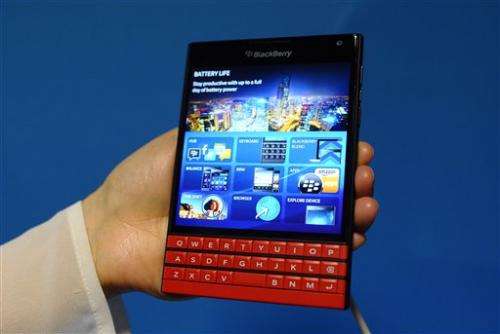A visitor uses his phone inside a pavilion at the Mobile World Congress, the world's largest mobile phone trade show, in Barcelona, Spain, Tuesday, March 3, 2015. (AP Photo/Emilio Morenatti)
As a major wireless show continues this week in Barcelona, Spain, Apple is highlighting the capabilities of its iPhone cameras with a gallery of photos taken by its users around the world.
Apple's campaign comes as Samsung unveiled new phones with improved photo-taking capabilities. The two companies have been fierce rivals, and one research firm said Tuesday that Apple bested Samsung as the world's top smartphone maker in the last three months of 2014.
Apple Inc. isn't at the Mobile World Congress show this week, but is making its presence felt, as new phones are inevitably compared with iPhones. Apple has its own event Monday in San Francisco, where it's expected to reveal more details about its upcoming smartwatch.
Here's a look at some of the developments at and beyond Mobile World Congress, which runs through Thursday:
___
APPLE'S REMOTE PRESENCE:
Apple is turning over a large portion of its home page, along with billboard and print ads in dozens of cities, to photos from its "Shot on iPhone 6" campaign. The company collected photos from 77 users around the world by combing through Flickr, Instagram and other sites (and getting permissions from the photographers). Apple is featuring 57 photos and three videos from those users at apple.com/worldgallery" target="_blank">apple.com/worldgallery . The rest are on print ads.
Apple is seeking to show that people can take quality images with iPhones, without needing to buy and carry a stand-alone camera. The photo captions describe what makes each image stand out and present tips and information on any apps and accessories used.
A worker holds the new Blackberry Passport smartphone at the Mobile World Congress, the world's largest mobile phone trade show in Barcelona, Spain, Tuesday, March 3, 2015. (AP Photo/Manu Fernandez)
The campaign launched Sunday just as Samsung Electronics Co. announced its new Galaxy S6 phones, which promise improved focus, low-light capabilities and color adjustments to account for ambient light.
___
THE ORIGINAL:
Before iPhones came around, there was the BlackBerry. But iPhones—and later, Android phones—showed people that smartphones can do much more than email and calls. BlackBerry was late in modernizing its operating system to offer those capabilities.
At the show Tuesday, BlackBerry CEO John Chen reiterated the company's "philosophical" shift away from merely making devices to becoming a leader in software, especially for businesses and even rivals such as Samsung.
Nonetheless, BlackBerry said it may launch four new smartphones over the coming year, including the BlackBerry Leap, a "low-to-mid" market phone that will go on sale in Europe in April. Although the Leap has a touch-screen keyboard, BlackBerry's head of devices, Ron Louks, told The Associated Press that BlackBerry remains committed to making models with its signature physical keyboards.
Visitors sit as they work with their computers during the Mobile World Congress Wireless show, the world's largest mobile phone trade show, in Barcelona, Spain, Tuesday, March 3, 2015. (AP Photo/Manu Fernandez)
___
DEFENDING REGULATION:
The head of the Federal Communications Commission is taking the defense of new Internet regulations on the road. During a keynote, FCC Chairman Tom Wheeler said "there needs to be a referee" for the Internet.
The FCC's vote last week approved "net neutrality" rules that prevent Internet providers such as Comcast and Verizon from slowing or blocking Web traffic or from creating Internet fast lanes that content providers such as Netflix must pay for. Broadband providers and Republicans have been critical of the new rules, and the FCC's decision is expected to trigger industry lawsuits that could take years to resolve.
A visitor uses his phone inside a stand during the Mobile World Congress Wireless show, the world's largest mobile phone trade show, in Barcelona, Spain, Tuesday, March 3, 2015. (AP Photo/Emilio Morenatti)
Wheeler did not specifically address the political aspect of the decision, but said "the people against it spawned all kinds of imaginary horribles. This is no more regulating the Internet than the First Amendment regulates free speech in our country."
© 2015 The Associated Press. All rights reserved.


























